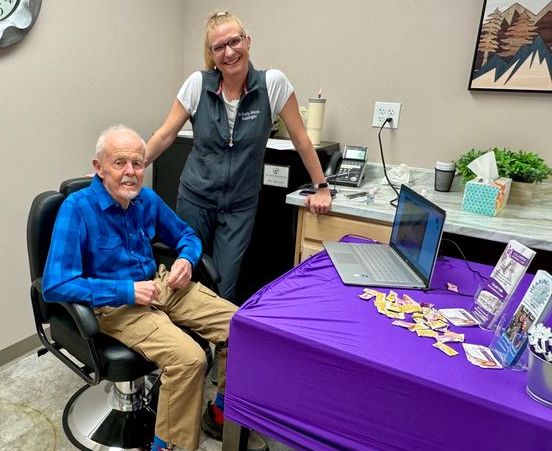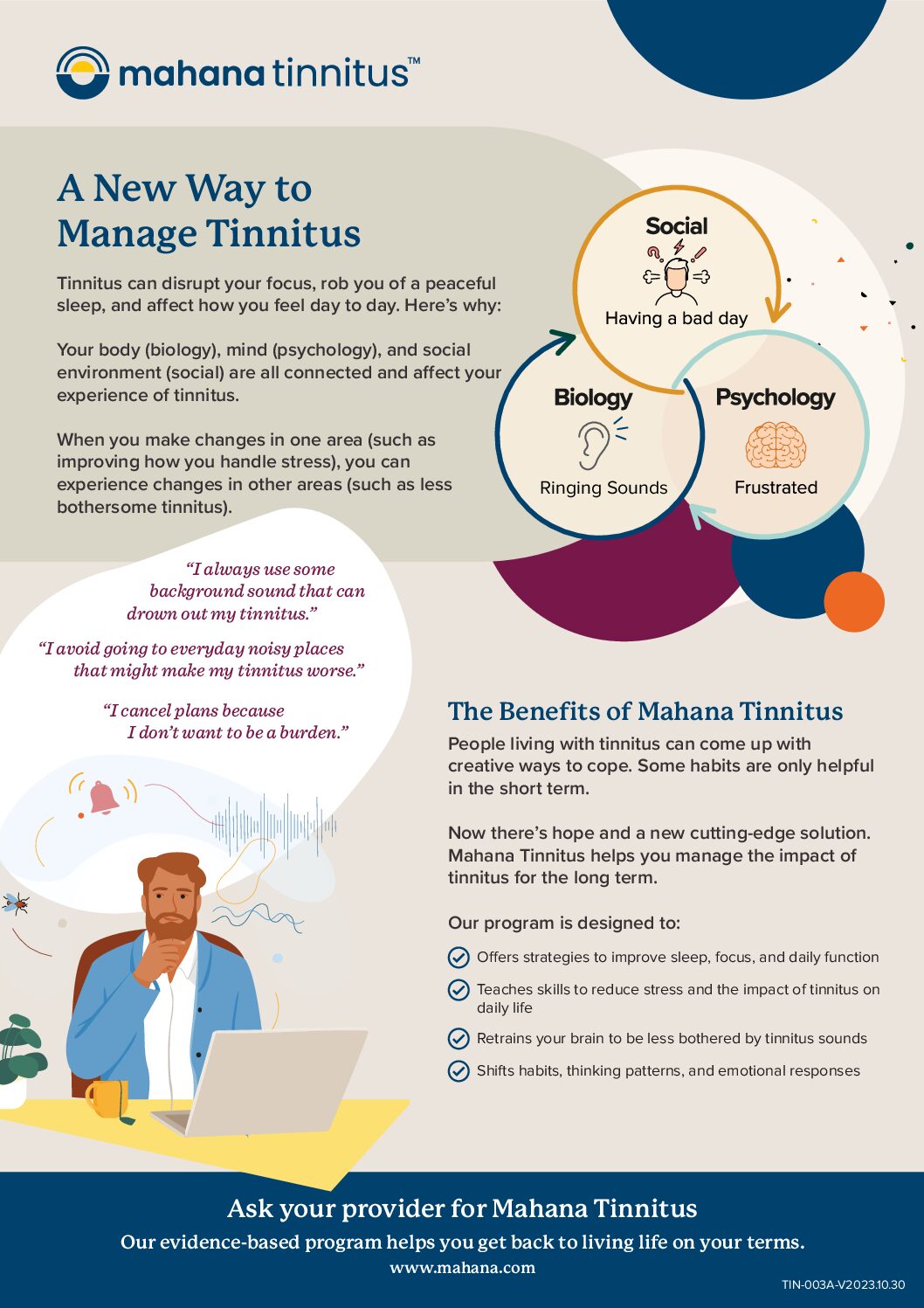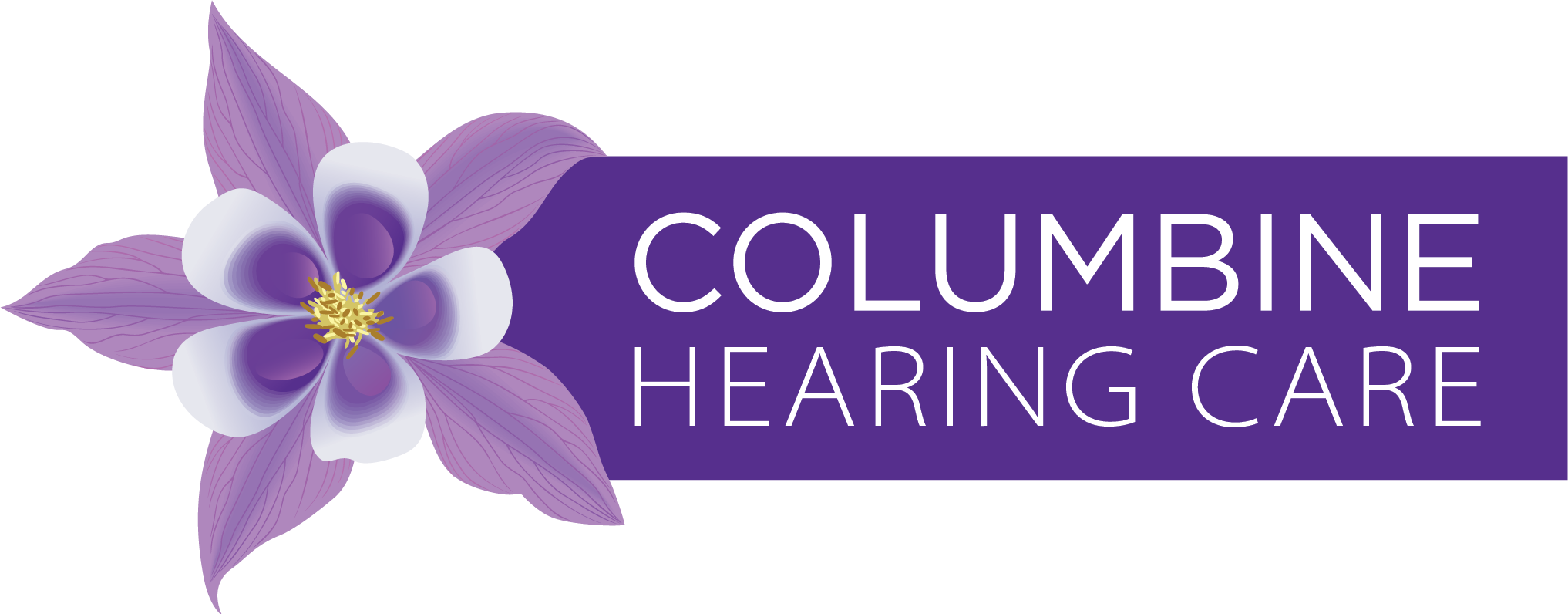Happy April to our Columbine Hearing Family!
I had a wonderful day at the Successful Aging Expo last Friday at Riverpointe Senior Living where I educated attendees about healthy hearing. I also performed video otoscopy so people could see their own ear canals and eardrums (ask us about this the next time you’re in and we’ll happily give you a peek inside your ears!). It’s always so much fun giving back to our community!
We look forward to seeing you in the office soon! 💜 Dr. Dusty

Upcoming Events
📆 Save the date! May is “National Speech-Language-Hearing Month” and we are looking forward to providing a few opportunities for you to learn about new hearing aid technology from hearing aid manufacturers and Dr. Dusty! Mark your calendars for May 24 & 31!
Stay tuned to our Facebook and Instagram pages for further details on this May Tech Talk Series! 🦻🏼
And did we mention free lunch?! 😉 You won’t want to miss these talks! Hope to see you there. 😊
Tinnitus. Although this word may be difficult to pronounce (we say it “tin-uh-tis”), its most basic meaning is a ringing, buzzing or other sound in your ears. This sound is personal to each individual – others cannot hear it (except in rare cases) – and the sound heard can vary from person to person. The effects of tinnitus are also wildly variable; for some it’s just an occasional, non-bothersome noise but for others it can be a daily struggle that elicits annoyance, distraction and difficulty living your “normal” life.
Click the button below 👇🏼 to read more about the signs of tinnitus and a brief overview of treatment options. While tinnitus cannot be cured at this point in time, there are several options available to manage tinnitus and its associated effects.
In an effort to better serve those living with tinnitus, Columbine Hearing Care is happy to announce a new offering: Mahana Tinnitus. See the flyer below for more information about this self-guided program (available for $300) aimed at lessening your tinnitus symptoms and improving your quality of life. Schedule a tinnitus consult today to speak with Dusty or Brenda further about Mahana Tinnitus and whether it may be a good fit for you.

The Villager’s Voice for Hearing Care
Check out the latest issues of the Villager Newspaper to read more from Dr. Dusty – the Villager’s Voice for Hearing Care.
Hearing Aids: Why They Matter & How to Choose the Best Options for YOU
Everything You Ever Wanted to Know About Earwax
Hearing Aids May Extend Your Life!
Hearing Aids for Ambassador Sam Zakhem
Brenda’s Sound Bites
As we journey through life, it’s essential to pay attention to the nuances of our health, even those seemingly small details like earwax. Yes, that waxy substance that occasionally makes an appearance when we clean our ears deserves a bit of attention. In this Spring edition of Sound Bites, I’m giving you the lowdown on earwax. We’ll delve into where earwax comes from, its importance for our bodies, and the proper ways to manage it.
What is Earwax and Where Does it Come From?
Earwax, also known as cerumen, is a natural substance produced by glands in the ear canal. These glands, called ceruminous glands, combine with sweat glands to create a unique concoction that serves a vital purpose in maintaining ear health. Earwax isn’t just a random buildup; it’s a combination of oil, sweat and dead skin cells, designed to protect and clean our ears. ⛑
The Importance of Earwax
Believe it or not, earwax plays a crucial role in keeping our ears healthy. It acts as a natural barrier, trapping and preventing dust, dirt, bacteria, germs, and other foreign particles that might enter the ear canal. 🦠 Additionally, earwax possesses antimicrobial properties, helping to fend off infections and keeping the delicate infrastructure of the ear safe from harm.
How to Manage Earwax
While earwax is beneficial, in some people, excessive buildup can lead to discomfort, impaction, and even hearing problems. Regardless of age, proper earwax management is essential for maintaining good ear health. Here are some tips (and, no, I don’t mean Q-TIPS 😇) on how to manage earwax effectively
- Avoid Over-Cleaning: While it may be tempting to clean your ears regularly, overdoing it can disrupt the natural pH balance of earwax production. You can actually make the problem worse. Instead, gently wipe the outer ear with a damp cloth when you bathe/shower.
Fun fact: Did you know that by rubbing something like a cotton swab around the inside of the ear canal stimulates the hair follicles and encourages them to produce more wax?! That was one of the first and most surprising facts I learned about ears.
- Use Ear Drops: If you’re experiencing a buildup of earwax, over-the-counter ear drops can help soften the wax, making it easier to remove. We’ve used a reliable brand for over 20 years! Be sure to ask us about them during your next visit.
- Seek Professional Help: If you’re experiencing significant discomfort or notice hearing loss due to earwax buildup, it’s best to consult a hearing healthcare professional (aka your favorite Audiologist: Dr. Dusty). Dr. Dusty can safely remove excess earwax using specialized tools, techniques and our world-class Earigator! Just click here to book your cerumen removal appointment.
Hopefully by learning more about earwax, you’ll develop a newfound appreciation for this dynamic substance and how it ensures that our ears remain healthy and functional for years to come. So, embrace the wax, but remember to keep it in check for optimal ear health.
Cheers to better hearing!
Brenda

